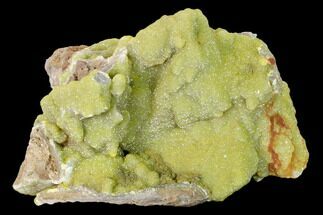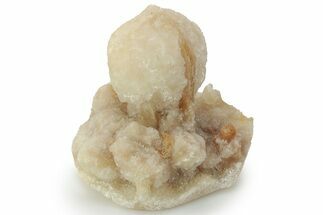This Specimen has been sold.
7" Sparkling, Botryoidal Yellow-Green Smithsonite - China
This is a sparkling, botryoidal smithsonite formation that is yellow with a slight green hue. The yellow coloration of the smithsonite can likely be attributed to inclusions of cadmium in the form of Greenockite. This same type of smithsonite formation occurs in Ireland and the Philadelphia Mine of Arkansas, however this specimen was collected from the Yunnan Province of China.
Under shortwave UV, this specimen fluoresces orange, with the most intense fluorescence occurring around the edges of the smithsonite.
Under shortwave UV, this specimen fluoresces orange, with the most intense fluorescence occurring around the edges of the smithsonite.
Smithsonite forms in earthy botryoidal masses, sometimes forming grape-like structures. It can be found as a secondary mineral in oxidation zones of zinc ore deposits, in some sedimentary deposits, and as an oxidation product of sphalerite. The general chemical formula of smithsonite is ZnCO3, however Fe (iron), Mg (magnesium), Ca (calcium), Cd (cadmium), Cu (copper), and Co (cobalt) can take the place of Zn (zinc). This potential for elemental variation results in smithsonite's wide variety of colors, including blue, green, yellow, orange, pink, purple, brown, gray, white, and colorless.
 Reviews
Reviews













